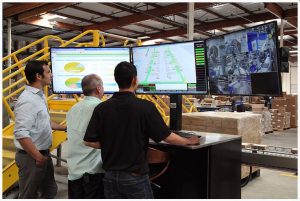
Business Intelligence in Modern Material Handling
TJ Burns | 06 September 2017
What Is Business Intelligence
As consumer needs get more demanding, material handling/logistics companies have their work cut out to keep pace and stay competitive. There is a plethora of unique technologies for developing a warehousing solution on a broad spectrum of varying complexities. In all of these solutions, the ability to monitor the system and make meaningful decisions for continued development is crucial.
"Business intelligence (BI) is a technology-driven process for analyzing data and presenting actionable information to help corporate executives, business managers and other end users make more informed business decisions. BI encompasses a wide variety of tools, applications and methodologies that enable organizations to collect data from internal systems and external sources, prepare it for analysis, develop and run queries against the data, and create reports, dashboards and data visualizations to make the analytical results available to corporate decision makers as well as operational workers."(http://searchdatamanagement.techtarget.com/definition/business-intelligence)
While not necessarily an industry-exclusive term, BI plays an invaluable role in the success of material handling companies that are charged with making real-time, potentially costly decisions with very little lead time. Big data and business intelligence is the driving factor for corporations to better understand everyday practices in the material handling industry.
Why Do We need Business Intelligence?
Any warehouse manager can attest to the difficulty of managing all the different functions that are going on at a given time.
- “How many containers do I have on the dock?”
- “Is picking keeping up with the day’s orders?”
- “Are my inventory levels dropping too fast?”
- “Who are my top/bottom performing operators?”
- “Do I need more manpower?”
- “Are there any production bottlenecks?”
Questions such as these could fill a book on warehouse management. Unfortunately, the answers to these questions can be hard to get, and the answers may be ambiguous based on who is answering. Enter BI… Business Intelligence solutions provide a method to clearing up the madness.
A top-tier Warehouse Management System (WMS), Warehouse Control System (WCS), or Warehouse Execution System (WES) performs by using data-driven applications that create, update, transact and delete data at a rate un-usable by a human. Even if the human could keep up, they would realize that most of the data is useless for decision-making.
However, a BI solution can glean the relevant information out of these systems and aggregate the data into useful information. With the details pre-organized and presented in standard ways, the user has “action-able” information that enables faster and more effective decision-making.
Requirements of a Business Intelligence Solution
So, what all does a good BI solution come with?
Flexibility
Obviously, a side-by-side warehouse comparison would quickly show that their processing systems can be vastly different. An e-commerce fulfillment center will have a drastically different solution than a manufacturing part storage system. However, a good BI solution will be able to extract the similarities out of the two systems to provide meaningful information to both without providing useless information that they have to dig through.
Stand-Alone from Production Environments
Business Intelligence is critical for success, but arguably not as important as the system operations itself. A responsible BI platform will provide an option for being stand-alone from the production system. The BI application may have just as much data and processing happening as the production environment, so it is important that the production environment does not see negative impacts to its performance due the Business Intelligence tier.
Real-Time/Pseudo Real-Time Updates
It may seem odd, but some Business Intelligence solutions may not provide real-time data to the user. There are many reasons for this, including the requirement above that BI be separate from production. Some platforms may only update datasets on a nightly or weekly basis. However, a top-tier BI solution will have a method of staying up to date with the production data without impacting the production environment.
Customization
At the end of the day, no BI solution will be able to fully encompass all requirements of all business types, personal preferences, and changing environments. Therefore, it is important that the BI solution include some method for the end user to personalize their experience. A popular solution is providing pre-defined “data cubes” that an end user can manipulate to make their own discoveries.
How Bastian Solutions Customers Take Advantage of BI
Our BI solution includes access to the Exacta Business Intelligence (ExactaBI) suite, which provides the user with all the tools necessary to run their business. The customers use the solution every day for high level metrics such as monitoring productivity of users, tracking warehouse operations, monitoring trends as well as low-level control such as monitoring the effectiveness of a SKU’s re-order point, checking an order status, or zone pacing/labor allocation.
The tools in ExactaBI have enabled Bastian Solutions customers to keep pace with the dynamic requirements from their customers and have helped keep or put them in competitively advantageous positions versus their competitors.
Industry Trends
Looking forward, Business Intelligence is moving towards making decisions autonomously without the need of user interaction for every decision. The BI solution will begin to lift the burden off warehouse managers and allow them to spend more time making holistic warehousing decisions rather than managing day-to-day operations. Ideally, the BI platform will provide mechanisms that allow users to build rules for automatically controlling changing environments and send notifications when the system identifies potential risks that the system cannot handle.
Summary
Business Intelligence is an integral part of a modern and developing warehousing solution. The implementation of a robust BI package will set a company way ahead of those without the solution and will allow it to stay competitive with other industry leaders. Learn more about Business Intelligence and Exacta: Supply Chain Software.
Comments
No comments have been posted to this Blog Post
Leave a Reply
Your email address will not be published.
Comment
Thank you for your comment.